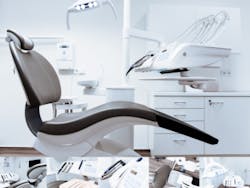5 things to consider when choosing dental practice software
Managing a dental practice involves many tasks that practitioners were not trained for in dental school. Appointments, billing, insurance coverage, marketing, and privacy laws can feel like big distractions from your patients’ oral health-care needs. That’s why choosing the right dental practice software will help you focus on your patients while also growing your practice.
Choosing the right software doesn’t need to be a daunting responsibility. Here are five considerations to keep in mind when selecting software for your practice.
1. What problems are you solving?
It’s a basic but necessary question to ask—what am I going to use this software for? Dental software solutions feature many tools to help professionals with necessary administrative tasks. Features may include:
• Appointment scheduling and reminders
• Recall systems
• Document management
• Clinical applications
• Patient relationship management
• Insurance and government coverage support
• Compliance
• Reporting and analytics
• Marketing
Each dental software system offers different features. Assessing your practice’s needs is the first step toward choosing the software that can best improve patient experience and business growth.
2. Is it easy to use?
Most employees expect an intuitive and easy-to-use platform in their workspace. All staff in the front and back offices should be trained easily on how to use the technology.
When choosing software, let all stakeholders take part in a demo if possible. Listen to everyone’s opinions on whether they had an enjoyable experience using the software. If all stakeholders had a pleasant time adjusting to the new solution, there are likely to be fewer frustrations with it down the road. Happy staff means happy patients. It’s a win-win.
3. What is the cost?
When it comes to investing in new or updated software, one of the most important factors is cost. Many factors can affect the cost of dental solutions, including whether it’s server or cloud-based, its functionality, its updates and scalability, the security, and whether or not if offers continued support.
When determining how much you’re willing to spend on a new platform, consider what value this product will bring to your practice. Spending more on a high-quality platform might boost income and reduce loss, which will improve your overall return on investment.
4. How are training and support?
Let’s face it, as a dental practitioner, you didn’t go to school for information technology development. Dental management solutions offer many advanced features that can help you grow your practice, but they’re only useful if you know how to use them.
Many modern dental systems are software as a service (SaaS) products. When you pay for a SaaS product, your customer experience does not end when you install the software. You can expect continued support, training, and consultation on how to best use the software for your business. Whether you’re a small, family operated clinic or an enterprise level network, dental IT experts can guide you and enrich your practice.
5. Do your peers trust this product?
The most proven way to select a trustworthy software is to learn from your peers. Reading marketing materials will provide you with insights on what a product does, but your peers can tell you honestly how dental software has impacted their businesses. Verified user reviews are a great way to learn from other dental professionals about the most effective and beneficial technologies available. If you have questions or doubts about a dental SaaS product, a salesperson will usually give you biased information, but fellow dental professionals will tell you the truth.
Brooklin Nash focuses on helping companies build their online brands with an engaging content marketing approach. With a bent for SaaS and business-to-business tools, Nash enjoys staying up to date and what can help businesses grow. He currently works and lives in Central America as a "digital transplant."







